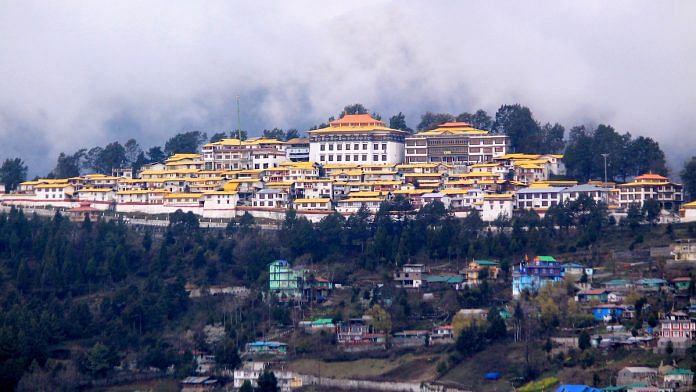On the one hand, Anubhav Sinha’s Anek hits the screen across India, and on the other, two IAS officers who walked their dog in a stadium in Delhi are transferred by the Ministry of Home Affairs to Arunachal Pradesh and Ladakh. What’s the connection between the two? While Anek makes an attempt to chip away at the racism meted out to the Northeast, people still consider postings to regions such as Arunachal Pradesh and Ladakh as ‘punishment postings’. Just look at the comments on the transfer.
Trinamool Congress MP Mahua Moitra tweeted, “Why shame Arunachal by transferring errant Delhi bureaucrat there? Why pay lip service to North East & then treat area like a dump for your rubbish, MHA?” While Jammu Kashmir National Conference leader Omar Abdullah asked why Ladakh was being considered a ‘punishment’ and said ‘it’s demoralising for the people there to be given the impression that officers only get sent as a punishment.’
The IAS officer couple in question — Sanjeev Khirwar and Rinku Dugga — were transferred after The Indian Express reported that the Thyagraj Stadium was emptied and athletes told to leave at 7 pm so that they could walk their dog. While we may not know the whole truth, the incident highlights how transfers to the Northeast are still seen by many — as a penalising move.
Also Read: Enjoyed ‘Anek’? Here are 7 films from Northeast that shed light on love, life & culture
Of exiles in history
From Napoleon to Bahadur Shah Zafar, people who ‘fail’ at war have often been exiled by the victors. While in the case of Zafar, it was the British who exiled him for his crime of revolt, artist MF Husain lived in self-imposed exile outside India after the controversy around his paintings in 2006.
In bureaucracy lingo, actions such as transfers are counted as punishment. The quick transfer of the IAS couple of the AGMUT cadre out of Delhi is also being seen as one — it hits their reputation and their seniority.
The idea of punishment is, of course, simple—send an individual to an unfamiliar, potentially hostile location. However, what forms unfamiliar and punishment today is clearly laced heavily with racism. Just look at this tweet:
Brilliant MHA. This will set an example for other high headed babus. Ek ko extreme North me bheja hai aur dusre ko extreme east me. Great. Spouse posting bhi gayi haath se. Ghumao ab kutta pahado aur jungalon me.
— THE SKIN DOCTOR (@theskindoctor13) May 26, 2022
While Ladakh and Arunachal Pradesh are places people would love to visit and take a million selfies, living and working there is clearly considered punishment because who would like to navigate a difficult terrain when they can have a stadium to themselves in the national capital? These states are fine when wanderlust hits you in peak summers. Otherwise, it’s a ‘lesson’ for errant bureaucrats.
After all, these places do not have high-end facilities for the privileged, the way Delhi does. In the case of the IAS officers, there is no deduction on salaries and the cost of living actually reduces. So what is the punishment? It’s the perceived social and cultural exile.
Also Read: Anubhav Sinha’s Anek only mildly hints at AFSPA violence in Northeast but drives point home
It’s a colonial, mainland mindset
India’s northeast and tough terrains such as Ladakh have for long been considered a punishment posting not just for civil servants but across various types of government jobs. In 2014, then-governor of Maharashtra, K Sankaranarayanan resigned instead of accepting his transfer to Mizoram. Kashish Mittal, a 2011-batch IAS officer, resigned in 2019 after he was transferred from NITI Aayog in Delhi to Arunachal Pradesh. That same year, Madras High Court Chief Justice Vijaya Tahilramani reportedly resigned after she was transferred to the Meghalaya High Court.
While a decision to resign would have made perfect sense in ’80s and ’90s due to the rampant insurgency in the Northeast, in current times, it’s a sheer display of racism.
Even the idea of ‘hardship allowance‘ for IAS officers appears derogatory to those who actually live in the northeast or Ladakh. The Northeast with its green cover and less densely populated cities surely can be a reward for the bureaucrats. Thankfully, people have called out the concept of ‘punishment’ posting on Twitter.
Arunachal Times journalist Tongam Rina pointed out how the issue had shifted from the blatant misuse of power by the IAS officer to racist, stereotypical comments on punishment postings to Ladakh and Arunachal Pradesh:
Mainland Indian media celebrating transfer of two IAS officers to #Arunachal and #Ladakh from Delhi for walking their dog after stadium closing time is what metro media is all about. Furthering the deep prejudice against border states and inability to ask valid questions.
— Tongam Rina (@tongamrina) May 26, 2022
I would only say, it would take anek films and anek changes in both policies and mindset to actually hope for an end to racist overtures when it comes to certain regions of India.
As long as we privilege Delhi for its connectivity and facilities instead of actually promoting similar if not equal facilities in all parts of India, postings to Northeast and Ladakh will continue to ‘haunt’ officers, and they would rather choose the ‘dignity’ of walking dogs in Delhi than ‘jungles and mountains’.
Views are personal.



